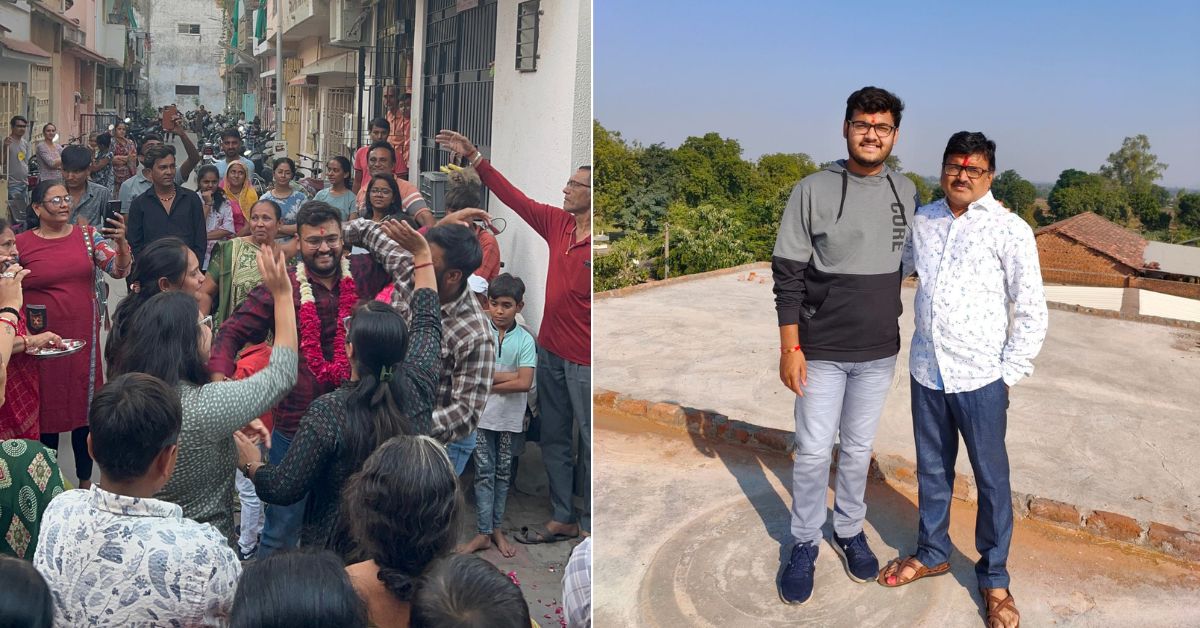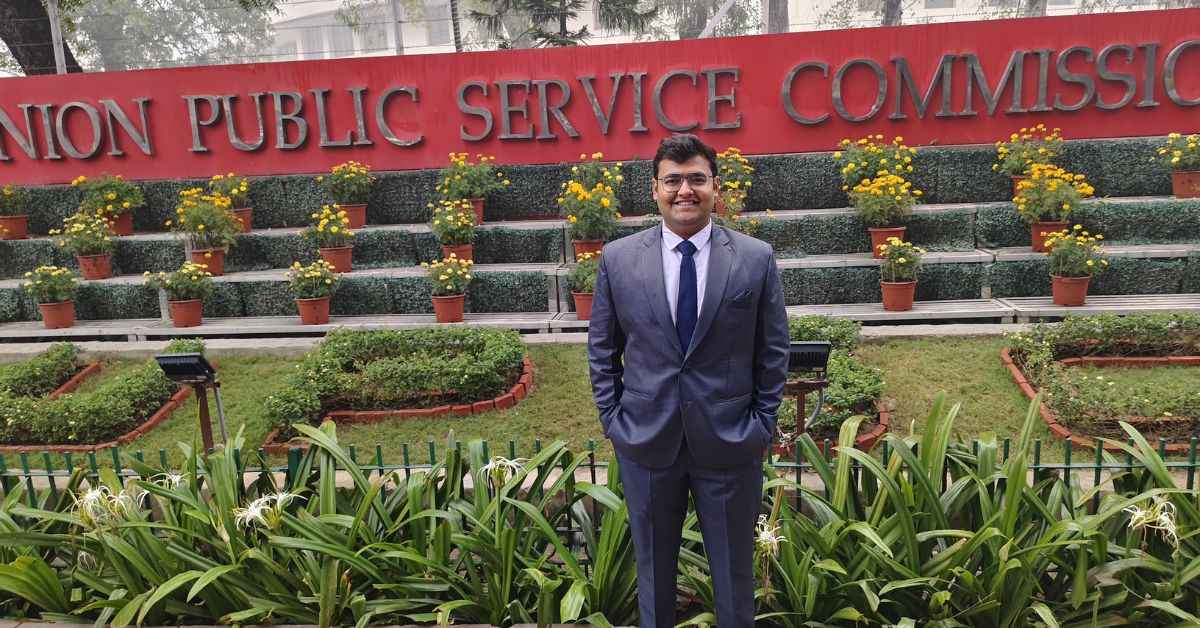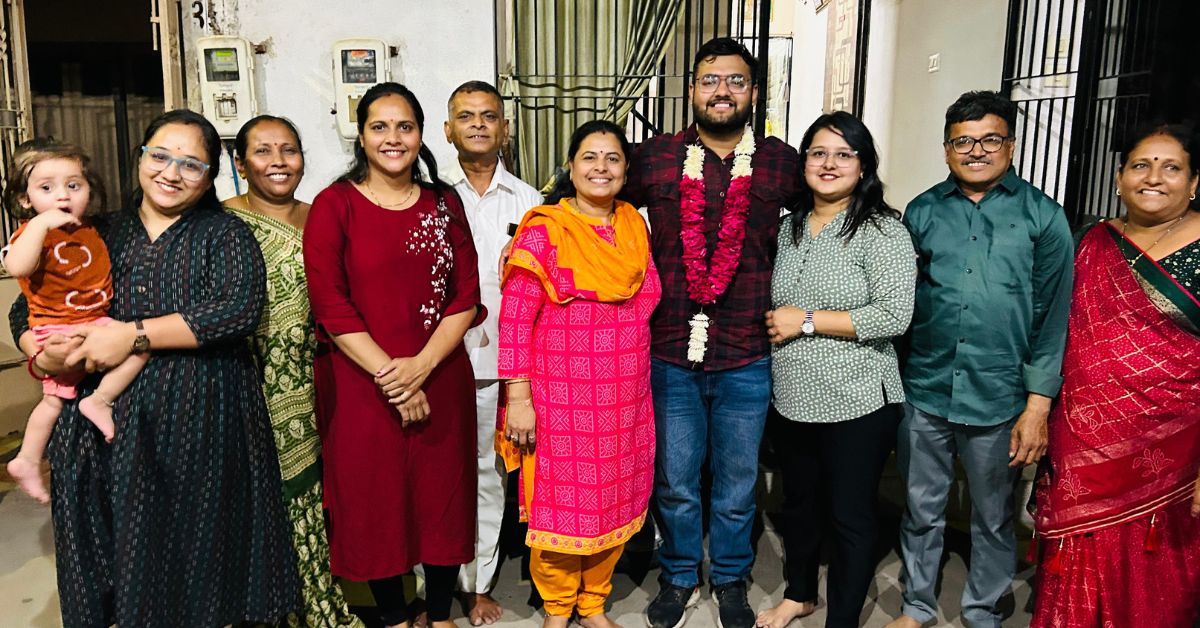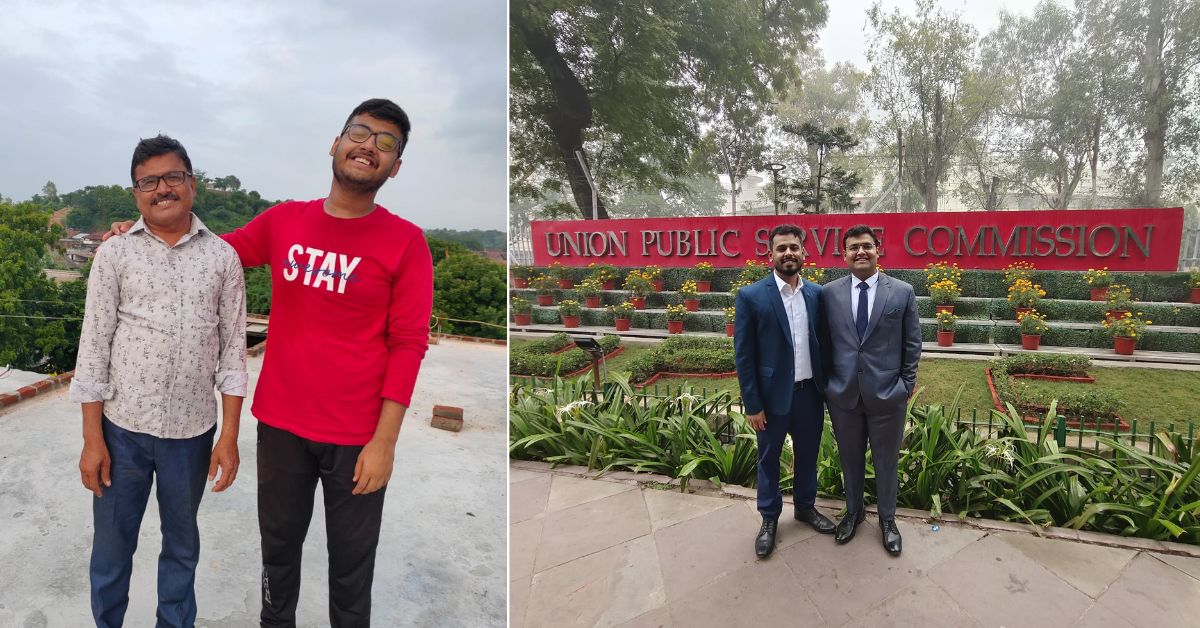How a Blacksmith’s Son Became an IAS Officer at 22 and Secured AIR 30
It was a chaotic, sunny afternoon. Ahmedabad-based Smit Panchal stood atop a building at a construction site, his fingers clenched tightly around a rope as he lifted heavy iron beams. What brought Smit there was his father’s deteriorating health.
His father, Hasmukh Panchal, a blacksmith by profession, had long been the lifeblood of this labourious work, despite the toll it took on his body. His health had been precarious since undergoing surgery in 2011, after which he was strictly advised to avoid lifting heavy weights. Yet, the necessity of providing for his family kept him trapped in the cycle of manual labour – a sight that pained Smit more than any academic setback.
“It was extremely difficult for me to watch my pappa (father) struggle with menial tasks. He would battle burning sensations and couldn’t sleep without pills. But I never saw him complain. He would endure every pain with a smile,” Smit shares in a heartfelt conversation with The Better India.
To ease some of his father’s burdens, Smit would accompany him to the construction site, assisting with major lifting tasks. “Pappa, don’t worry, I will do it now,” he would reassure him, as they pulled and fitted massive iron structures, weighing 100-500 kilograms, onto towering buildings.
The labour was not just physically taxing but emotionally wrenching. Yet, Smit was motivated by his desire to help his father avoid kaali majduri (menial labour) due to his health condition.
 At his home in Ahmedabad, the once oppressive clang of metal beams has been replaced with the sound of dhols, garlands, and merriment.
At his home in Ahmedabad, the once oppressive clang of metal beams has been replaced with the sound of dhols, garlands, and merriment.
With the echoes of hammers and the clanking of metal as his daily soundtrack, Smit was inspired by his cousin’s advice to prepare for the UPSC (Union Public Service Commission) Civil Services Examination. Amidst the dust and noise, he made a quiet vow: if he didn’t succeed in his UPSC pursuits, he would continue the gruelling work of construction labour himself and ensure that his father could finally retire in peace.
Determined to pursue this goal, Smit chose to study Arts for his undergraduate degree after completing Class 12, believing it would give him more time to focus on UPSC preparation. After graduating in 2022, he moved from Ahmedabad to Delhi the same year to begin formal coaching for the examination.
A son’s quiet promise
Even as he pursued this dream, doubts crept in. “Sometimes, I wondered if I should have opted for a more secure path, like engineering, so I could at least support my family financially. The burden of not being able to help my family was consuming me,” he recalls.
But Smit had already set his sights on the prestigious UPSC examination. His perseverance finally bore fruit when he saw his name among the toppers in the UPSC-CSE 2024 results, declared on 22 April 2025. Securing an impressive All India Rank (AIR) 30 in the 2024 examination on his second attempt, the 22-year-old is now an IAS officer!
This achievement was more than a personal triumph — it was a liberation for his father, a promise fulfilled to free Hasmukh from the gruelling demands of construction work. He approached his father with sweetness and resolve. “Now, Pappa, it’s time for you to rest.”
 At the young age of 22, Smit Panchal became an IAS officer.
At the young age of 22, Smit Panchal became an IAS officer.
In his first attempt in 2023, Smit faced a significant setback when he failed the CSAT [Civil Services Aptitude Test] section by a narrow margin of 2.5 marks. The failure was particularly disheartening, especially since he had feared underperforming in both General Studies (GS) and CSAT. When he received his marksheet, he found that he had actually performed well in GS, but CSAT cost him his chance to sit for the Mains examination.
It was the pressure to perform in CSAT that led him to make hasty, last-minute decisions during the exam, which proved detrimental. “In the final five minutes, I attempted five more questions in a bid to be on the safe side, but all were incorrect. I was disheartened when I didn’t find my name in the list, but I was more affected when I saw that while I did not clear CSAT, I scored well in GS,” he shares.
Following this setback, Smit returned home to Ahmedabad. “I couldn’t afford to stay in Delhi any longer. It was my cousin Kaushal who sponsored my coaching fee and accommodation costs, which were more than Rs 5 lakh. While he never said a word, I felt embarrassed to ask for further financial help,” he says.
After some time, Smit returned to Delhi to prepare for the Mains. This time, he took up a job as a counsellor in a local coaching institute. “I needed a job to fund my three-month stay in Delhi. Once I felt I had saved enough, I quit the job to focus fully on preparation,” he mentions.
Over time, Smit worked to improve his approach to CSAT. He had already mastered the elimination technique for multiple-choice questions of GS and recognised the need for a more diligent focus on CSAT preparation.
 Despite setbacks and financial hardships, Smit secured AIR 30 in his second attempt.
Despite setbacks and financial hardships, Smit secured AIR 30 in his second attempt.
By the 2024 prelims, he had changed his strategy. He focused on previous years’ questions (PYQs) related to CSAT and began rigorous preparation by mid-March. Fortunately, due to elections in 2024, the prelims exam was delayed by 20 days, giving him valuable extra time, which he dedicated entirely to honing his CSAT skills.
Smit used this period to attempt numerous tests and engage in constant revision. He even simulated the examination environment by sitting for mock tests in the afternoon to build his endurance and familiarity.
Persistently, he strengthened his concepts in mathematics topics like permutations, combinations, and PYQs — sometimes even studying during meals.
From setbacks to second chances
Despite initially feeling like he might fail again, Smit realised he had underestimated himself and the strides he had made in mastering the CSAT section. “I’d told my brother-in-law that this was my last try. If I failed this time, I would not have given another attempt and joined my father in his work,” he says.
Thankfully, he didn’t need to — he cleared the examination!
But this triumph was not just Smit’s personal victory. It was a collective crescendo of familial sacrifice, perseverance, and love, especially that of his father and cousin. “I am grateful to their sacrifices, selflessness, and support,” he shares.
 Smit with his father Hasmukh and cousin Kaushal.
Smit with his father Hasmukh and cousin Kaushal.
Smit’s father, Hasmukh, shares with The Better India, “I cannot express in words how happy and proud my son has made us. Until now, no one in our family had become an IAS officer. Now, my colleagues tease me, saying they’ll have to address me as ‘sir’, given that my son will travel in a car with a blue beacon light.”
Regarding his decision to leave his job, Hasmukh remains modest. “I appreciate that my son doesn’t want me to work anymore, but I don’t want to just stay idle at home. An idle body becomes useless.”
Meanwhile, back in Ahmedabad, the once oppressive clang of metal beams has been replaced with the sound of dhols, garlands, and merriment. “People who once doubted my resolve and discouraged me from preparing for UPSC are now bringing flowers,” Smit smiles.
As he prepares to leave for Mussoorie — home to the Lal Bahadur Shastri National Academy of Administration (LBSNAA), where IAS officers undergo their training — Smit finally feels a profound sense of relief and accomplishment.
Edited by Khushi Arora; All images courtesy Smit Panchal
News